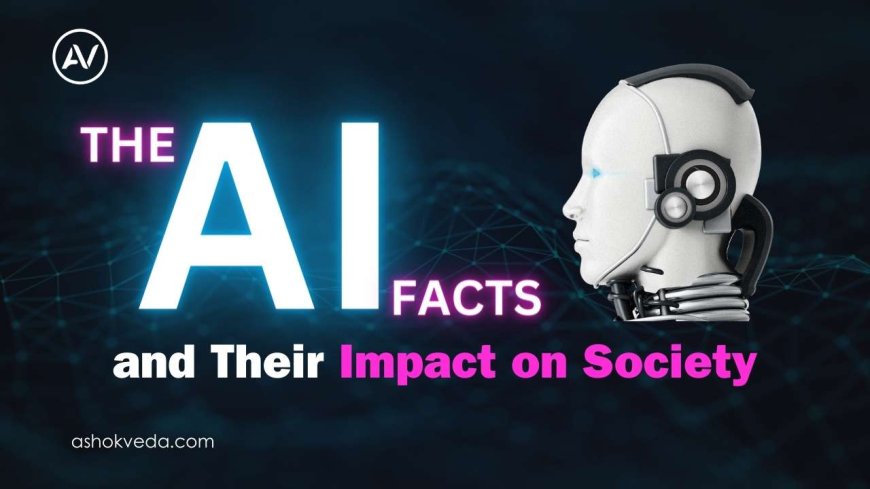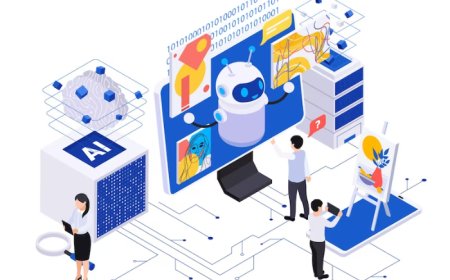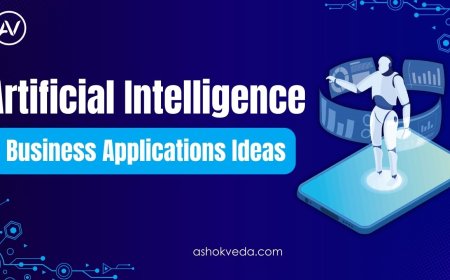Top AI Facts and Their Impact on Society
Learn the top AI facts and their impact on society with our understanding analysis.

Artificial intelligence (AI) technology gives us creative solutions in a wide range of fields, gradually changing the way we interact with the outside world. The way AI technologies are transforming industries by improving decision-making abilities and streamlining operations is one of the most remarkable AI facts. AI's use in digital marketing, where it analyzes data to improve plans and personalize customer experiences, is another noteworthy feature of the technology. The application of AI in education, which offers personalized learning paths and interactive learning environments, also represents an important development with AI experts. In addition, the development and improvement of these technologies by experts in AI are having an important effect on economic systems and societal standards. The phrase "Top AI Facts and Their Impact on Society" sums up the essence of artificial intelligence's capacity to transform society by showing how its applications are not just theoretical but also how they are influencing how we live every day.
Understanding AI
In the branch of computer science referred to as artificial intelligence, or AI, systems are created that are intended to carry out activities that normally require human intelligence. Among these are speech recognition, decision-making, language translation, and pattern recognition. AI's main goals are to automate routine tasks, improve decision-making through better data analysis, and streamline operations. People can now concentrate on more complex or creative activities as a result. In simple terms, artificial intelligence (AI) seeks to fit in seamlessly with our everyday activities, improving how we engage with technology and streamlining our regular tasks.
Various types of AI
There are three primary types of artificial intelligence (AI):
-
Narrow AI: This type of AI is used for specialized activities, such as making Netflix program recommendations or speech recognition on a phone. It's the kind you come across most frequently daily.
-
General AI: Though it's not yet a reality, general artificial intelligence (AI) is capable of a wide range of tasks, much like humans.
-
Super AI: It is still only a theoretical concept, yet it would be infinitely more intelligent than humans in every way.
AI helps us in many different ways in our daily lives. It can create reminders, direct us through traffic, and even make recommendations based on our preferences. Our everyday tasks are simplified and made more effective by these technologies.
Top AI Facts: Innovations and Developments
The general public and IT experts have taken notice of several important advances in artificial intelligence (AI).
- Language Models: Artificial intelligence (AI) systems, such as OpenAI's ChatGPT, have advanced to the point where they can understand and produce language that resembles that of a person, creating new opportunities for content creation and automated customer service.
- Medical Diagnostics: Artificial Intelligence is advancing the field of medicine significantly, particularly in the area of disease diagnosis via medical imaging. These days, algorithms can identify diseases like cancer or retinal disorders just as accurately as human specialists.
- Autonomous Vehicles: Advances in AI have sped up the development of autonomous vehicles. Vehicles from companies like Waymo and Tesla are already capable of navigating intricate urban situations with little assistance from humans.
The impact and investment in AI continue to grow:
- Investment: By 2025, it is predicted that global spending on AI will total $340 billion, indicating a high level of faith in the technology's potential.
- Employment: AI is offering new work opportunities in fields including AI maintenance, development, and training, despite concerns about job displacement.
- Productivity: AI has improved productivity in several industries, and these gains have been substantial. AI-driven automation, for instance, has shortened lead times and optimized production lines in the industrial sector.
Impact of AI on Various Industries
Artificial intelligence (AI) is becoming more and more prevalent in several industries. Here's a summary of how AI is impacting several industries in modern business:
-
Healthcare: By enabling easier and more precise diagnosis, individualized treatment plans, and more effective patient data management, AI is contributing to better patient outcomes.
-
Finance: AI is used in financial services for risk management, fraud detection, algorithmic trading, chatbots, or automated advisers that improve customer experience.
-
Retail: AI is changing the shopping experience in the retail industry by streamlining inventory management, enhancing supply chain efficiency, and making tailored suggestions.
-
Manufacturing: Artificial intelligence (AI) technologies are being utilized to improve quality control, forecast maintenance requirements, and optimize production processes. These applications all help to save costs and increase production rates.
-
Transportation: AI helps the transportation industry build driverless cars and streamlines logistics, enabling businesses to schedule routes more effectively and expedite delivery times.
-
Education: AI in education provides methods that can adjust to each student's unique learning speed, automates administrative duties, and gives customized learning experiences.
How AI is creating new job opportunities
Artificial Intelligence (AI) is creating new jobs in addition to automating current ones. Companies that use AI will need people to develop, control, and improve these systems. As a result, new positions have come up, such as AI specialists who specialize in developing AI technologies and AI trainers who instruct the systems on how to interact with users. In addition, as AI grows, there will be an increasing need for experts who can deal with the ethical issues it presents and guarantee that AI is applied appropriately. Thus, although AI may change the way we work, it additionally generates new job customers across a variety of sectors.
AI in Education and Learning
By increasing accessibility and offering specific learning experiences, artificial intelligence (AI) is changing education. Systems powered by AI may adjust course material to each student's preferred learning style and speed, providing a more individualized educational experience. AI can improve learning outcomes by, for instance, suggesting resources based on a student's skills and deficiencies. Additionally, by providing adaptive learning technologies that meet different needs, including voice-to-text for people with visual impairments or interactive classes for students with difficulties with learning, AI tools help overcome barriers for students with disabilities.
In conclusion, Artificial intelligence (AI) is transforming the way that we work and live, affecting a wide range of industries like education and healthcare. Artificial intelligence is increasing productivity and creating new jobs by increasing efficiency and improving decisions. As AI grows, it is essential to address ethical concerns. All things taken into account, artificial intelligence's frequency across businesses and daily life shows how significantly it could influence our future, ensuring more intelligent technological interactions and constant advancement.





































